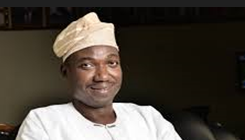The Resurgence of Yoruba Traditional Religious Practices: Interview with Professor Olukoya Ogen

Please briefly introduce yourself
My name is Olukoya Ogen. I am a Professor of History and the Director of Research and Innovation Management at Osun State University, Osogbo, Nigeria. I am a cultural historian with special bias for the socio-economic and religious history of Yorubaland. In the course of my career, I have succeeded in attracting a range of prestigious British, American and European postdoctoral fellowships / research grants. I am a Fellow of the Historical Society of Nigeria and a Member of the Nigerian Academy of Letters. In 2018, I received the Ali Mazrui Prize for Excellence in Scholarship as well as two Lifetime Achievement Awards and was appointed an Endowed Professor of Education by ICT University, Yaoundé, Cameroon in 2019. As an established scholar, I am widely travelled and well-published.
What project have you worked on during your fellowship period?
The study that I worked on as a LUCAS-LAHRI Visiting Research Fellow tries to problematise the revitalisation, globalisation and adaptability of Yoruba indigenous knowledge systems with special emphasis on Yoruba belief systems, spirituality and traditional medicine. The study obtained relevant data from personal observations, electronic survey and qualitative interviews carried out across Yorubaland for a period of over six months.
What are the findings of your project so far?
The study finds out that new movements that are committed to the propagation of African traditional religious practices have emerged. In fact, these religious practices remain resilient and have been attracting re-converts from Islam and Christianity. An interesting phenomenon is the form of close social contact between monotheists and traditionalists across the length and breadth of Yorubaland. The study further confirms the influx of Yoruba traditional religious worshippers to Europe and the United States and a thriving foreign market for Yoruba alternative medicine. Thus, based on empirical empirical evidence the study submits that locally and globally, Yoruba belief system as well as spirituality is currently witnessing a resurgence. Even more significant for the broader question of public health is the fact that available evidence suggests that there is an increasing reliance on Yoruba alternative medicine by Africans both at home and in the diaspora. The conclusion is that the globalisation of Yoruba traditional religious practices and medicine is founded on the legendary resilience of Yoruba cultural values.
How does the project speak to the overall theme of “African knowledges for global challenges”?
Given the increasing globalisation of Yoruba traditional medical practices and its implications for public health, alongside the continuing desire to look for alternatives to mainstream medicine, this study explicitly engages and expands the overall theme of the LUCAS/LAHRI Visiting Research Fellowships “African knowledges for global challenges”?
Is there anything you would like to add?
I am exceedingly grateful to the University of Leeds for the award of the LUCAS/LAHRI Visiting Research Fellowship. I am also very appreciative of the invaluable support, guidance and mentorships of my two supervisors - Prof. Adriaan Van Klinken and Dr. Abel Ugba. Indeed, some of the ideas that came up during the series of robust interactions that I had with them formed the kernel of a follow-up proposal on Yoruba cultural resilience as exemplified in the potentials of Yoruba oral arts. I am delighted to announce that the said proposal was approved for funding by UNESCO under its International Fund for Cultural Diversity (IFCD) grant on the 10th of February 2023. I look forward to bringing both Adriaan and Abel on board as Advisers or Consultants on the UNESCO-funded study and continuing our working relationship.
